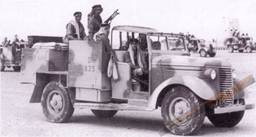Pages in Section 5

Afternath of the 1929 Riots
i. The Dowbiggin Report
ii. Re-organisation of the Palestine Police
iii. The Black Hand
iv. The 1933 Riots
v. The Arlosorrof Case and Creation of the Dog Section
vi. King George V's Silver Jubilee
vii. The Black Hand re-emerges
In early 1930 a second TJFF cavalry squadron was raised and a mechanised company, based at Ma'an, was formed later that year. This would increase forces need to conbat rioting in both Palestine and Trnsjordan but motorization also extended the range of the TJFF further into the desert so the camel companies were disbanded.

The TJFF in 1930 had 17 British officers, two serving in each of the four squadrons and companies, with the remainder based at TJFF HQ. By 1935 there were 24 British officers - the O/C, seven majors, and sixteen captains. The other ranks numbered 980 which included 28 Jews.
The British government ordered an enquiry into the causes of the riots (The Shaw Commision)It found Arab concerns about the Balfour Declaration and Jewish Immigration were the root cause of the riots and predicted more riots in the future unlass the government clarified its position on Arab Rights)
Exerpts and recommendations from the Shaw Commision Report can be found hereEnglish Excerpts from the Shaw Commission Report 1930.pdf
The government also set up the Hope_Simpson Enquiry into Immigration, Land Settlement and Development.
The Hope Simpson Report can be found here.The Hope Simpson Report 1930.pdf
As a result of the Hope Simpson Report the government published the Passfield White Paper restricting Jewish immigration. The Palestinian High Commissioner Lieutenant Colonel Sir John Robert Chancellor GCMG, GCVO, GBE, DSO helped write this White Paper.
The Passfield White Paper can be found sandwhiched between paragraphs of the following article in the Jewish Vrtual Library.Pre-State Israel - The Passfield White Paper
However, Prime Minister Ramsay McDonald interpreted the terms in such a way that Jewish immigration continued unabated.
The question of who was to be in charge of security in Palestine, army or air force, came to the fore again. The High Commissioner wanted the War Office in control with military command transferred to GOC, Egypt, but the British Government kept the Air Ministry responsible for security in both Palestine and Transjordan.
Herbert Layard Dowbiggin,Inspector General of the British Ceylon Police,was seconded to Palestine to advise on the re-organisation of the Police Force which had failed to foresee the riots.
See next page and